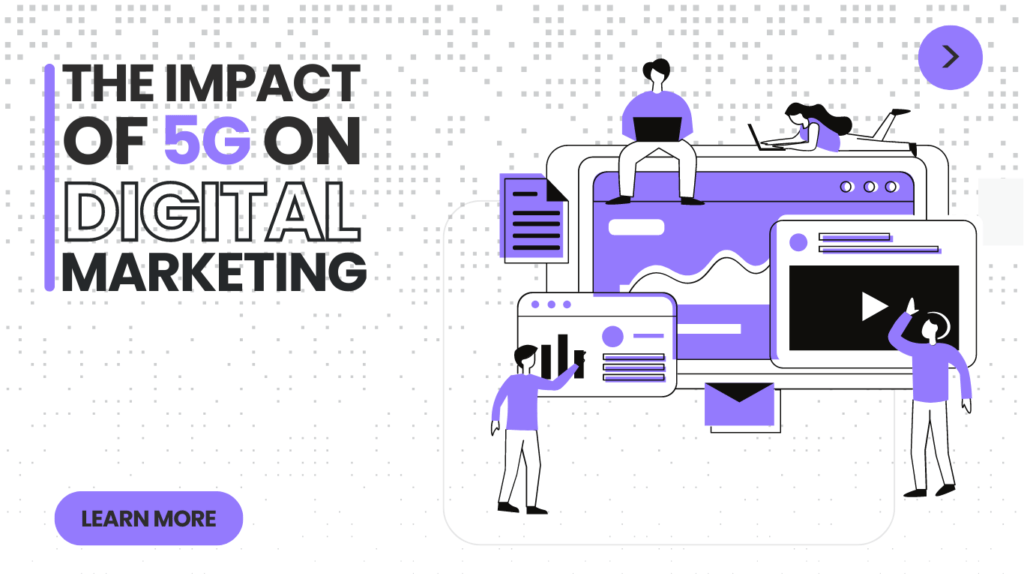
How 5G is Transforming Digital Marketing
5-G technology is transforming several sectors, and digital marketing is no exception. Promising faster speeds, less latency, and improved connectivity, 5G is poised to fundamentally change how companies interact with consumers online. For digital marketers, however, this implies differently. The effects of 5G on digital marketing will be discussed altogether with the fresh prospects it offers, the difficulties it brings, and how marketers can get ready to fully use it.
5G and Its Transforming Speed
5G offers a whole revamp of mobile communications, not only a speedier variation on 4G. With speeds up to 100 times faster than 4G, 5G provides faster loading times and more seamless browsing. This speed makes it possible to experience high-quality video streaming, augmented reality (AR), and virtual reality (VR), all of which are becoming increasingly important in digital marketing strategies.
- Faster Content Delivery: 5G speeds mean content—especially movies and interactive media—will load nearly instantly. On websites and apps, this can greatly lower bounce rates and increase user interaction.
- Enhanced Mobile Experience: 5G allows mobile users to enjoy desktop-like speeds, therefore improving their surfing experience and motivating longer interaction with content.
5G Affects Mobile Marketing Techniques
Digital marketing efforts center on mobile marketing, and 5G is poised to transform it. Faster bandwidth and reduced latency will translate into better mobile experiences, more immersive and interactive mobile advertisements, and more individualized marketing.
- Augmented Reality (AR) and Virtual Reality (VR): Minimal lag allows 5G to provide augmented reality (AR) and virtual reality (VR) experiences. This creates fresh directions for virtual try-ons, product demos, and immersive brand encounters.
- Rich Media Ads: 5G will let rich media ads not be limited to Wi-Fi surroundings. Companies can now use interactive, premium advertising with better attention-grabbing power.
5G's Importance in Video Marketing
A major player in digital marketing is video marketing, hence 5G will only help to improve its effect. With the features of 5G, videos should get even more interactive and interesting.
- Live Streaming: High-quality live streaming free of buffering will eventually become standard. Product introductions, webinars, and live Q&A events let businesses involve viewers in real time.
- 360-degree footage: 5G’s speed and connectivity let 360-degree videos to be seamlessly streamed, therefore enhancing viewers’ immersive experience and enabling companies to stand out.
5-G Personalized Marketing
Personalizing is another major influence of 5G on digital marketing. The ability to process massive amounts of data at unprecedented speeds means that marketers can provide more personalized content to users based on real-time data.
- Real-Time Data Analysis: 5G lets data analysis happen in real-time, which lets companies change their marketing plans on demand.
- Targeted Advertising: Marketers can use 5G’s features to design very focused ad campaigns, hence raising the likelihood of conversion.
5G's Effect On Consumer Experience
Success of digital marketing depends mostly on the customer experience, hence 5G will greatly improve it. Faster loading times, interactive content, and real-time personalizing can all help to increase customer loyalty and happiness.
- Improved User Experience: Faster speeds and lower latency imply that consumers no longer have to wait for material to load, therefore enhancing their surfing experience.
- Higher Engagement Rates: With 5G, websites and apps will probably get more responsive, so increasing engagement rates. Content that loads swiftly and runs smoothly will appeal to users more likely to engage with.
5G's Difficulties With Digital Marketing
5G offers certain difficulties even if its advantages for digital marketing are enormous. These difficulties must be known to marketers if they want to keep ahead of the curve.
- Increased Costs: Development of excellent, 5G-optimized content can be expensive. Companies might have to spend more in developing immersive experiences including AR, and VR.
- Security issues: Greater connectedness carries more risk. Given 5G may create new vulnerabilities, marketers must be alert about data security and privacy.
Getting ready for a future in digital marketing driven by 5G
Digital marketers have to start planning now for the effect of 5G if they are to remain competitive in the changing terrain. These covers investing in rich media content, maximizing websites and apps for speed, and investigating new forms including AR and VR.
- Adopt New Technologies: Marketers should begin experimenting with AR and VR to produce original consumer experiences.
- Give data security top attention: Ensuring consumer data protection should be given top attention given the higher data flow.
Conclusion
Ultimately, by allowing faster, more customized, and more immersive consumer experiences, 5G is poised to completely change digital marketing. Still, it also brings fresh difficulties, such possible security dangers and higher expenses. Those who embrace 5G technology, modify their approach, and concentrate on providing premium content will be positioned to succeed in this new age. Thanks to 5G, digital marketing is fast, linked, and bursting with opportunity.

